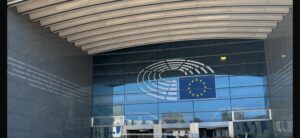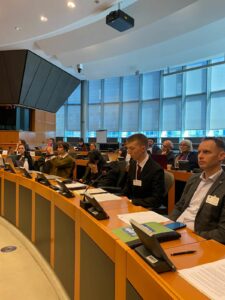
On March 18th, 2025, EASE had the honor of participating in the Stakeholders’ Dialogue hosted by the European Parliament as part of the report on the Role of EU Policies in Shaping the European Sport Model. This event marked a crucial step in advocating for the values and vision that EASE believes should shape the future of European sport. The dialogue provided a platform to assert EASE’s commitment to fostering a socially responsible, sustainable, and inclusive European sport model, while encouraging meaningful collaboration between various stakeholders in the sport sector.
The Central Role of the European Social Charter for Sport Events (ESCSE)
At the heart of EASE’s intervention was the European Social Charter for Sport Events, a foundational document that sets a high standard for the governance, workforce conditions, and sustainability of sports events across Europe. Developed through an Erasmus+ Sport project, the Charter reflects the combined expertise of numerous sports event organizers, including the Paris 2024 Olympic and Paralympic Games, the 2023 Rugby World Cup, and various national and international sporting bodies. It was formally presented in Brussels in 2023, with the support of Members of the European Parliament, including Tomasz Frankowski.
The ESCSE outlines 13 key commitments that are essential for ensuring the long-term sustainability and social responsibility of sports events. These commitments focus on the following three main pillars:
- Inclusive and Transparent Governance – Engaging all stakeholders in the decision-making process, ensuring transparency and accountability.
- Workforce Conditions – Ensuring that all employees and volunteers involved in the event work in safe and fair conditions, with the opportunity to benefit from their participation.
- Sustainability – Developing strategies that consider the long-term legacy of infrastructure, environmental impact, and community engagement.
EASE’s primary recommendation is to integrate the ESCSE into the core framework of the European Sport Model, ensuring that it becomes a reference document for all sports event organizers across the EU. This is seen as a critical step toward establishing a culture of responsibility in European sport.
EASE is actively promoting the ESCSE through European tours aimed at disseminating the Charter in multiple EU countries, including Slovenia, Estonia, Austria, Bulgaria, and Germany. These efforts aim to increase adoption and further embed the principles of the ESCSE into the daily operations of sports events across the continent.

Ten Detailed Recommendations for Shaping the European Sport Model
In addition to advocating for the ESCSE, EASE presented ten comprehensive recommendations that address key aspects of the European Sport Model. These recommendations were developed with input from various stakeholders and aim to ensure that the future of European sport remains inclusive, equitable, and sustainable. Below is a detailed breakdown of these recommendations:
1. Integration of the European Social Charter for Sport Events as a Core Pillar of the European Sport Model
EASE’s flagship recommendation is to incorporate the European Social Charter for Sport Events as an integral element of the European Sport Model. This document sets high standards for governance, workforce conditions, and environmental sustainability, making it a powerful tool for shaping more responsible and transparent sports events across Europe. EASE is committed to ensuring that the Charter becomes a reference point for all sports event organizers, setting a European benchmark for social responsibility.
2. Strengthening Social Dialogue in Sport
Social dialogue is essential for the health of the European sport sector. EASE advocates for social dialogue to be recognized as a structural element of the European Sport Model, ensuring that discussions, consultations, and joint actions between employers and workers are prioritized. This approach should be in line with Article 154 of the TFEU, the Val Duchesse Agreements, and the ongoing work of organizations like FIFPro and the European Leagues. By strengthening social dialogue, EASE envisions a more inclusive and collaborative sport environment in Europe.
3. Expanding the Erasmus+ Sport Program
EASE strongly recommends the growth of the Erasmus+ Sport program, which is currently a vital tool for ensuring that sports organizations receive the resources and support they need to contribute to the European Sport Model. EASE calls for the program to focus more heavily on the contribution to the European model of sport as a key criterion for funding eligibility. By expanding Erasmus+ funding, EASE believes that European sports organizations will be better equipped to meet EU goals and contribute meaningfully to the European Sport Model.
4. Recognizing the Entire Sport Movement
EASE advocates for a holistic approach that recognizes the contributions of all sectors of the sport movement, from professional sport to grassroots sports and leisure structures. This inclusive view ensures that the economic and social specificity of each part of the sport ecosystem is acknowledged and valued, allowing for a more balanced and comprehensive European Sport Model.
5. Raising Awareness of Energy Consumption in Sport
Given the growing energy crisis, EASE proposes raising awareness of the impact of energy consumption within the sport sector. EASE’s Talk n°5 highlighted how energy-saving measures and public support can mitigate the financial strain of rising energy costs. It is crucial for sport organizations to adopt energy-efficient practices and to work together with policymakers to address this urgent issue.
6. Promoting Financial Solidarity
EASE’s sixth recommendation focuses on promoting financial solidarity among sports organizations to ensure the sustainability and integrity of the European Sport Model. By fostering cooperation and resource-sharing, EASE believes that the sport sector can be more resilient to challenges and threats, especially those emerging from the professional sub-sector.
7. Safeguarding the Traditional European Sport Model Against Disruptive Initiatives
EASE is firmly committed to safeguarding the traditional European Sport Model, emphasizing that initiatives like the Super League pose a significant threat to the values of open competition and inclusivity. EASE advocates for strong legal frameworks to protect the principles of the European Sport Model and calls for CJEU rulings that respect the integrity of this model.
8. Developing a European Model for Organizing Sport Events
EASE proposes the development of a European model for organizing sports events, which would be based not only on the principles of the European Social Charter but also on the six priorities that each host country defines when organizing events. These priorities include the promotion of the event, economic benefits, and community engagement, ensuring that sports events bring long-term value to both the host country and the wider European community.
9. Addressing the Challenges of New Technologies and AI
As new technologies and artificial intelligence transform the sports sector, EASE emphasizes the need to help sport employers navigate these changes. EASE’s Talk n°9 outlined the ethical and legal risks associated with these technologies and stressed the importance of providing training and support to ensure a responsible integration of new tools into the sport industry.
10. Strengthening Federative Structures
EASE’s final recommendation highlights the need for robust federative structures to support the social dialogue and financial solidarity necessary to protect and promote the European Sport Model. The importance of these structures was underscored during the Olympic Games conference in Paris (2024), where it was noted that a strong federative framework is essential for maintaining an open, inclusive, and sustainable European sport system.
Conclusion: A Future for European Sport
EASE is proud to be at the forefront of shaping policies that will define the future of European sport. By advocating for the European Social Charter for Sport Events, expanding social dialogue, and promoting sustainability and solidarity, EASE is committed to building a European Sport Model that is not only competitive and innovative but also ethically sound and inclusive for all stakeholders.
With its ongoing efforts to promote the Charter across Europe and its continuous involvement in policy discussions, EASE is playing a pivotal role in ensuring that European sport remains a model for the world to follow.